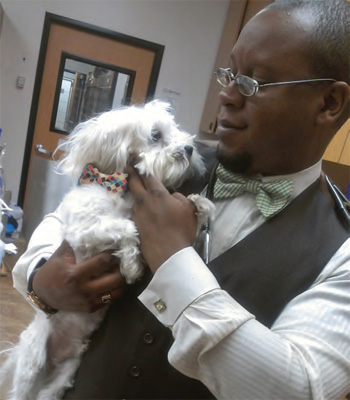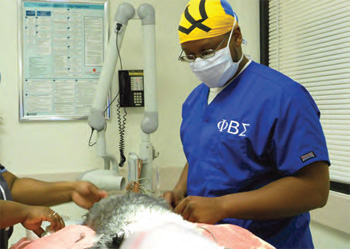- Posted in All University
- Category: Campus News
Tarron Herring ’02 was just 9 years old when he decided that he wanted to be a veterinarian.

Veterinarian Tarron Herring holds a patient, a Maltese dog, at Banfield Pet Hospital in the metro Washington D.C. area.
After graduating from John Jay High School in Brooklyn, New York, Herring earned a degree in biology cum laude from Lincoln and matriculated to the Tuskegee School of Veterinary Medicine where he earned honors for his out-patient care in 2006.
Since April 2015, Herring has been area chief of staff for two fully equipped, fully staffed veterinary hospitals in Glen Burnie and Hanover, Maryland, within the Banfield Pet Hospitals group. He has served as chief of staff since 2009. He says the leadership skills he gained as a resident advisor at Lincoln gave him the foundation needed.
Herring continues to rack up professional honors, too. He has been recognized as one of the best veterinarians across Banfield Pet Hospital’s 900 locations nationwide, achieving “Top 10” doctors of veterinary medicine several times.
Herring credits his Lincoln education with instilling in him problem solving and creative thinking, two skills important in medicine. He says Lincoln was his first choice because he wanted small class sizes with “strong student-professor relationships.”
“I wanted to be in an environment that allowed me to have complete access to my professors.”

Tarron Herring prepares to remove a tumor from apatient. Herring is wearing scrubs with the crest of PhiBeta Sigma Fraternity, Inc., of which he is a member.
That’s exactly what he found at Lincoln. He praises biology professors David Royer and Donald Ford who helped him not only in the classroom, but with the lengthy application process for veterinary school.
“They both challenged me to dig deep and find the best me,” Herring says.
Royer says he remembers Herring as a student with a “quiet passion for veterinary medicine, a passion that helped him to overcome several obstacles in his quest to become a veterinarian.”
“He is a great role model for anyone who has to struggle to achieve a goal,” Royer says.
ADAPTABILITY KEY TO SUCCESS IN VETERINARY MEDICINE
For students considering the challenging, diverse, evolving field of veterinary medicine, he thinks the most important trait for success is adaptability, because “veterinary school is unlike anything that you will ever encounter,” Herring said.
“As you grow as a doctor, you will be challenged in many different ways,” he says. “To save lives requires you think outside of the box, be flexible, and be innovative. Veterinary medicine has grown and pet
owners no longer see them as pets; they are now considered members of the family. As a result, our responsibility is so much more important than ever before.”
Herring’s participation in Lincoln’s Horace Mann Bond Honors played a role in helping him learn to navigate the workplace. He cites Emmanuel Babatunde, a sociology professor, as a key mentor and instructor associated with the honors program.
WORK LIFE BALANCE: COMMITMENT TO FAMILY AND COMMUNITY
While he has immense responsibilities to patients, their owners and staff, Herring is equally dedicated to his family. He married Crystal Herring (née Anderson), his college sweetheart, and together they have
three daughters.
“Our two oldest want to be veterinarians and at ages 7 and 5, already they say that they will attend Lincoln on their journey to be doctors.”
Herring believes playing an active role in the community is important. He is an active member of Phi Beta Sigma Fraternity Inc. and the Prince Hall Free and Accepted Masons of Maryland, William T. Wallace Lodge No. 134. He and his wife collect toys each year to donate to the children’s hospitals in Maryland.